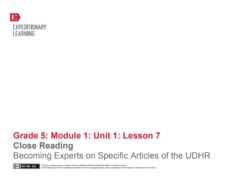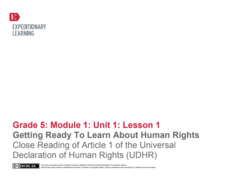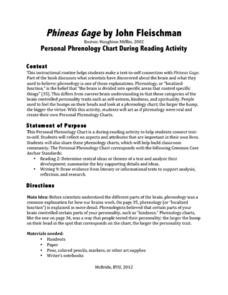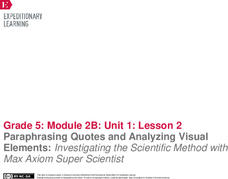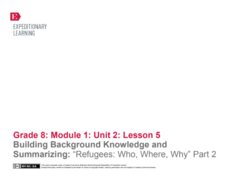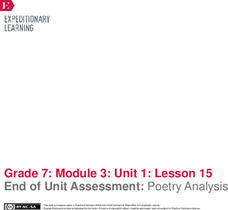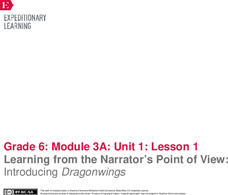Core Knowledge Foundation
The Ancient Roman Civilization Tell It Again!™ Read-Aloud Anthology
A read-aloud anthology presents texts about the ancient Roman civilization. Lessons introduce readings, followed by a discussion and extension activities—word work, comprehension practice, and more. Writing focuses on opinion pieces, and...
Ed Worksheets
Read the Story
Want to boost your readers' comprehension skills and strategies? Look to these five pages, each with a short story and questions to answer covering main idea, facts, sequence of events, context clues, conclusions, and making inferences.
EngageNY
Close Reading: Becoming Experts on Specific Articles of the UDHR
A continuation of the previous lesson, which is part of a larger group of lessons on human rights (see additional materials). Here, in Lesson 7, your class will explore more articles from the Universal Declaration of Human Rights. After...
EngageNY
Getting Ready to Learn About Human Rights: Close Reading of Article 1 of the Universal Declaration of Human Rights (UDHR)
Introduce young readers to informational texts with a well-designed, ready-to-use, and Common Core-aligned unit. Young readers learn a variety of skills while studying the Universal Declaration of Human Rights (UDHR). As the first...
EngageNY
Close Reading: Unpacking Specific Articles of the UDHR
Lesson 6 of this extensive unit finally has your class begin to work their way through specific articles from the text of the Universal Declaration of Human Rights (UDHR). Before examining the rights actually detailed in the document,...
Core Knowledge Foundation
Unit 6: American Revolution
The American Revolution is the theme of a five-week unit that focuses on reading, grammar, morphology, and writing. Scholars read and respond to texts, practice spelling and word work, and write paragraphs. Assessments gauge comprehension.
Core Knowledge Foundation
First Grade Skills Unit 2
Nineteen lessons make-up a four-week-long unit that explores long vowel sounds, nouns, and 11 high-frequency words. Lessons scaffold information to gain confidence in reading a decodable text and answering questions. Routines include...
Core Knowledge Foundation
Kindergarten Skills Unit 6
Throughout 15 lessons, scholars explore four and five-sound and rhyming words, closely examining initial and final consonant sounds, and begin reading the text independently. Each lesson follows a similar routine; an introduction to...
Curated OER
Phineas Gage: Personal Phrenology Chart During Reading Activity
Phrenology, the belief that parts of your brain control certain aspects of your personality, is described in Phineas Gage: A Gruesome but True Story About Brain Science. While we now know much more about the brain, learners use this idea...
Poetry4kids
How to Recite a Poem like an Expert
Don't just read a poem, recite a poem! Add speaking skills to a poetry unit with an activity that promotes successful poem recitation. Scholars choose a poem then recite it with the help of several tips and videos.
EngageNY
Building Background Knowledge About the Hero’s Journey, Part 2: Acts 2 and 3 Plus Focusing on Key Vocabulary in “The Hero’s Journey”
It's all in the details. Scholars read acts two and three of The Hero's Journey and collect important details from the text. They share their notes with their peers and listen for key words from the story. They then turn their attention...
Birmingham City Schools
Stick to the Point: Getting It Right with Constructed Responses
Practice writing constructed responses with a 26-slide presentation. Developed to guide scholars through the appropriate steps, the resource assists them in providing a well-considered answer.
Core Knowledge Foundation
Kindergarten Skills Unit 7
A unit consists of seventeen lessons that examine six new consonant digraphs. Lessons review past concepts, introduce sounds and spelling, and offer differentiated instruction in small groups. Learners begin reading a decodable story and...
EngageNY
Introducing Research Folders and Generating a Research Question
Take the next step in the writing process with a lesson plan geared towards the completion of writing an evidence-based essay about a rule to live by, as Bud did in Bud, Not Buddy by Christopher Paul Curtis. Pupils collaborate with their...
University of Kansas
Feelings - Thematic Unit
Boost language skills with a unit all about feelings. Scholars from all grade levels take part in several lessons that incorporate specific vocabulary terms and adjectives while discussing their feelings with their peers. Reading...
EngageNY
Paraphrasing Quotes and Analyzing Visual Elements: Investigating the Scientific Method with Max Axiom Super Scientist
Pay close attention. Learners discuss the things close readers do and record them in a chart. They then silently reading section 1 of Investigating the Scientific Method wit Max Axiom Super Scientist and write the gist of the text in...
Core Knowledge Foundation
Unit 3: Adventures of Don Quixote
Fifth graders explore the Adventures of Don Quixote in a four-week language arts unit. Scholars listen to and discuss a new chapter each day as well as examine vocabulary and practice word work including suffixes, subject-verb agreement,...
EngageNY
Inferring About Characters Based on How They Respond to Challenges (Chapter 4: "Los Higos/Figs")
How do you know what a character's personality is like if an author doesn't tell you? With a focus on character development in Esperanza Rising, pupils complete a jigsaw activity to analyze the actions of Mama, Abuelita, and Miguel. Once...
EngageNY
Building Background: A Short History of Human Rights
Before continuing to read the Universal Declaration of Human Rights, learners need to understand why and how this document was written. First, show and discuss a video from UNICEF to demonstrate the need for such a document. Then have...
EngageNY
Building Background Knowledge and Summarizing: “Refugees: Who, Where, Why” Part 2
What are some universal aspects of refugees' experiences worldwide and throughout history? Scholars read the text "Refugees: Who, Where, Why" and create two class anchor charts. Finally, they each write a paragraph that provides an...
EngageNY
End of Unit Assessment: Poetry Analysis
Learners finish the end-of-unit assessment by completing a poetry analysis of We Wear the
Mask. Scholars may use their Poet’s Toolbox reference sheets and How to Read a Poem anchor
charts to guide them through the assessment.
EngageNY
Learning from the Narrator’s Point of View: Introducing Dragonwings
Journey into the past with Laurence Yep's Dragonwings. Scholars complete anchor charts to analyze techniques the author uses to develop the narrator's point of view in his novel. As they read, pupils also complete word catchers to track...
EngageNY
Introducing “Comprehending the Calamity”
Some things are beyond comprehension. Scholars read an excerpt from "Comprehending the Calamity," a primary source text about the 1906 San Francisco earthquake. After identifying the gist, pupils complete anchor charts to analyze how the...
EngageNY
Revising for Organization and Style: Bold Beginnings
Get young writers thinking about how to write a great beginning for their narratives. After examining examples of solid beginnings in literary text, young writers discuss the criteria for a compelling introduction. Then, independently,...




